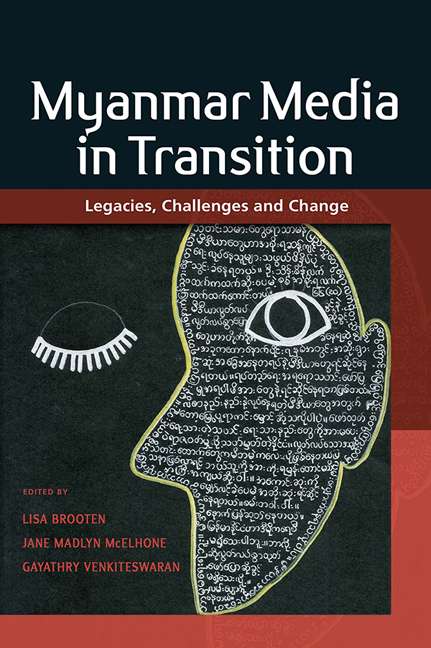Book contents
- Frontmatter
- Contents
- Contributors and Editors
- Burma or Myanmar? A Note on Terminology
- 1 Introduction: Myanmar Media Historically and the Challenges of Transition
- Part I Structural Constraints and Opportunities
- 2 Legal Changes for Media and Expression: New Reforms, Old Controls
- 3 Whispered Support: Two Decades of International Aid for Independent Journalism and Free Expression
- 4 The Changing Face of Print Media: An Interview with News Veteran Thiha Saw
- 5 Privacy Risks in Myanmar's Emerging ICT Sector
- Part II Journalism in Transition
- Part III Creative Expression
- Part IV Society and Media
- Epilogue: Media Studies in Myanmar – Where Do We Go from Here?
- Index
4 - The Changing Face of Print Media: An Interview with News Veteran Thiha Saw
from Part I - Structural Constraints and Opportunities
Published online by Cambridge University Press: 07 September 2019
- Frontmatter
- Contents
- Contributors and Editors
- Burma or Myanmar? A Note on Terminology
- 1 Introduction: Myanmar Media Historically and the Challenges of Transition
- Part I Structural Constraints and Opportunities
- 2 Legal Changes for Media and Expression: New Reforms, Old Controls
- 3 Whispered Support: Two Decades of International Aid for Independent Journalism and Free Expression
- 4 The Changing Face of Print Media: An Interview with News Veteran Thiha Saw
- 5 Privacy Risks in Myanmar's Emerging ICT Sector
- Part II Journalism in Transition
- Part III Creative Expression
- Part IV Society and Media
- Epilogue: Media Studies in Myanmar – Where Do We Go from Here?
- Index
Summary
The publication in 2013 of Myanmar's first private daily newspapers in half a century was one of the most important and exciting moments for journalists and editors since the country's political opening. Thiha Saw launched one of those first private newspapers — the Englishlanguage Myanmar Freedom Daily. He has been part of the country's print media sector since 1979, most recently as executive editor at Myanmar Consolidated Media (MCM), where he oversaw the country's only English-language daily, Myanmar Times, a Myanmarlanguage weekly, and MCM's online team. Myanmar Media in Transition contributing editors Jane Madlyn McElhone and Gayathry Venkiteswaran interviewed veteran publisher, journalist and editor Thiha Saw in 2017 and 2018 to talk about his experiences and his expectations of the political opening.
Q: You are one of Myanmar's print media veterans and a vocal champion of the private media sector. You got your start, though, during the military regime working for state-controlled print media until an unexpected chance came along to do independent journalism.
TS: Yes, I started at one of the two English-language state papers, Working People's Daily, in the late 70s, and then moved to the statecontrolled Myanmar News Agency in the early 80s. Then, in August 1988 [during the student-initiated uprising], we got our chance. A group of young and mid-career editors, including me, took over six Burmese- and English-language newspapers and ran a free press for about three weeks. We told the chief editors to go away and had a brief, amazing, period of press freedom. Then a new military government took over and they sent me a letter saying I was allowed to “retire” prematurely.
Despite the new military regime and your own so-called retirement, that's when you started witnessing slow change in the print media sector.
Well, there was strict pre-publication censorship, so there was no possibility of having a private daily newspaper, but there were dozens of private monthlies run by journalists and writers. So in 1990 I launched my first private publication — a monthly business journal called Myanmar Dana. To publish on time, we had to send our content to the censors at least one week before deadline. We also had to find someone who would lease us a licence. In those days licences were issued to government departments or officially recognized groups, like writers’ groups or associations for retired police officers.
- Type
- Chapter
- Information
- Myanmar Media in TransitionLegacies, Challenges and Change, pp. 131 - 136Publisher: ISEAS–Yusof Ishak InstitutePrint publication year: 2019



